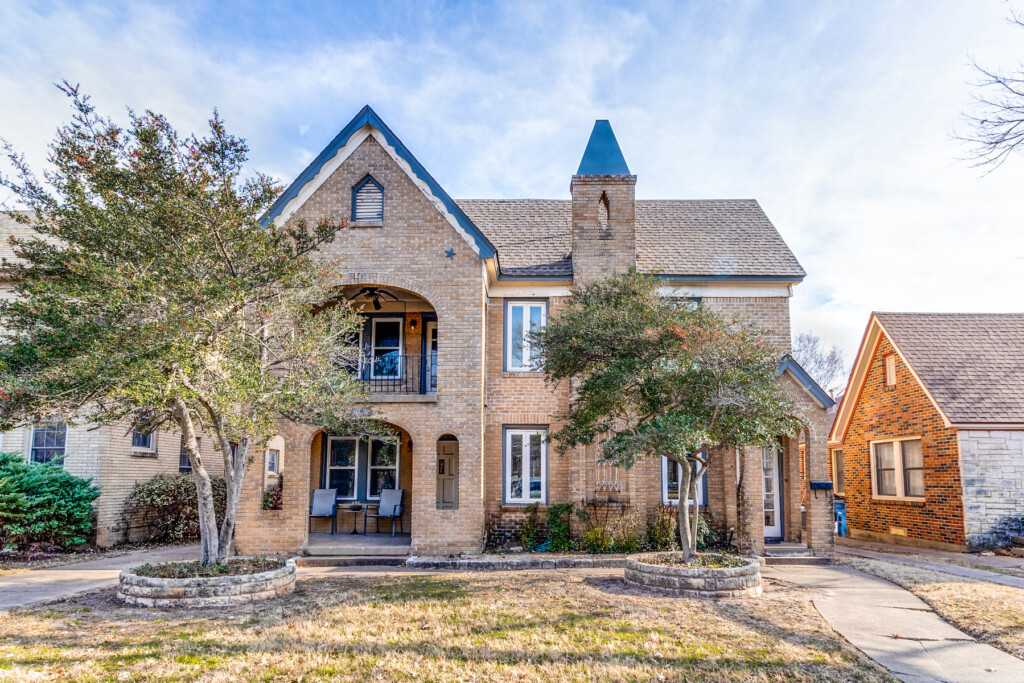Among the Dallas City Council, it will be difficult to even discuss adding light density—duplexes, triplexes, and quadplexes—to neighborhoods that presently allow only single-family homes. A Tuesday morning meeting about researching the matter was more pugilistic than instructive, as a majority of the Council’s housing committee sought to quash even the possibility of adjusting the mix of housing types in these neighborhoods.
Briefings aren’t usually so punchy. The purpose of this special meeting of the City Council’s Housing and Homelessness Committee was to talk, for staff to explain its process and gather questions from council members as City Hall rewrites its land use and development codes. These discussions are perhaps the most important happening today at 1500 Marilla. They will shape how our city grows (or doesn’t) by dictating what can be built and where.
Dallas neighborhoods are becoming more expensive. According to a recent analysis of the market, most residential construction creates houses that sell for a median of $1.4 million. After that, we build a bunch of houses that cost about $670,000. A different analysis found a gulf of 33,600 rental units for individuals who make 50 percent of the area’s median income, which, based on analysis of Census labor data, includes more than one third of the city’s residents.
In short, too many people already can’t afford to live here. What happens if you buy a $1.4 million house but can’t find a nearby dry cleaner because the owner of that business had to move to Celina? Furthermore, duplexes and triplexes contribute more per acre to a city’s tax base than a single-family home. This is a math problem. The city isn’t advocating for doing away with single-family; it wants to research the result of creating more of a mix of housing types, which, if successful over time, will contribute more to the city’s tax base than the status quo.
There are, of course, many reasons for these market trends. Some things the city has control over (permit processing, for instance) and others it does not (interest rates, supply-chain problems). City staff are tackling one of the things that could help impact the supply: allowing more than one unit of housing on lots that presently can hold only one.
Staff on Tuesday presented to a largely hostile audience, one that had little patience for suggestions that could change the makeup of most of the city’s zoning. The takeaway among six of the nine members who attended the meeting: stay away from our single-family residential neighborhoods. “I want the families in the single-family districts to know we have their best interests at heart,” said Deputy Mayor Pro Tem Carolyn King Arnold, whose District 4 includes south and east Oak Cliff.
“I support density. I support having more people being able to live in the city of Dallas, but it has to be in the appropriate place,” said Councilman and Committee Chair Jesse Moreno, who represents Deep Ellum, the Medical District, and the Cedars.
“Do you think the current owners in a developed single-family neighborhood had any expectation when they purchased their home that a neighbor or multiple neighbors would change their area so dramatically?” asked Councilwoman Cara Mendelsohn, of Far North Dallas.
Andrea Gilles, the city’s interim planning director, and Andreea Udrea, the assistant director of planning and urban design, gave a presentation that defined the city’s existing residential zoning types and set the table for what they plan to research. Their work follows efforts in cities such as Austin, whose City Council earlier this month changed its zoning to allow up to three units per lot. Dallas is nowhere close to making such a decision. There is presently no proposal in front of Council. Gilles and her team are still gathering information from Council as they work to simplify the ways in which the city allows different types of housing and where.
“We do acknowledge we need to create more housing options that are possible to be built at different price points,” Udrea said. “The market is trying to provide a little bit more housing, but the zoning on the ground is not zoned for these housing types.”
Tuesday’s meeting was requested by Councilman Chad West, of North Oak Cliff, and four of his colleagues. They used a method known as a five-signature memo, which allows council members to ask for a discussion of a topic. West’s memo asked for a “briefing to explain the process and potential effects” of allowing two-, three-, and four-unit complexes on lots zoned for single family, as well as reducing the minimum lot sizes. Most of Dallas’ residential land is zoned for lots between 5,000 square feet and 7,500 square feet that hold a single home; West would like to see the city investigate the impact of lowering that requirement to 1,500, like in Houston, or 2,500, as in Austin.
An increasing body of research shows that home ownership is already out of reach for Dallasites making near the area median income of $58,000, while there aren’t enough rental units to meet demand. Much of Dallas is zoned for single-family residential, so the type of “missing middle” housing that we need is difficult, if not impossible, to build in most of Dallas.
“We are late to the game on this conversation. There are cities that addressed this 10 years ago and we are now just starting to have the conversation,” Gilles said. “The reality is, the pressure on our neighborhoods is not going to change if we don’t change anything. Our city is changing, so how are we going to adapt to that change?”
Gilles and Udrea acknowledged that the city will need to establish design standards so that the denser housing units would resemble the existing homes near them, both in height and size. They both emphasized that whatever happens isn’t like snapping a finger; it can take years to see even incremental changes.
“I hear frequently from residents, ‘My kids can’t move back to Dallas, they can’t afford to live in Dallas,’” said Councilwoman Gay Donnell Willis, whose district includes Preston Hollow. “I think that’s wrong. We know we need more missing-middle housing, we need duplexes, triplexes, quadplexes, rowhouses, townhouses, garden homes—we need more of that. The name is missing middle for a reason.”
Councilman Paul Ridley, whose District 14 encompasses downtown, Uptown, and East Dallas, noted that the area he represents is seeing single-family replaced with multifamily along Fitzhugh and Bennett avenues. He directed staff to research parts of the city that could accommodate density, like commercial districts or near transit, “areas where there is no current development.” He said the idea of loosening the zoning code to allow this sort of density in residential neighborhoods was a “mistake” that would “water down our existing single-family zoning.”
“That will not be accepted by our residents in single-family districts who have what they consider a social contract with the city to allow and promote single-family, traditional neighborhoods,” he said. There is no such contract. Cities change, especially as new needs and desires arise. They morph and flex and bend and swell. Dallas, for better and for worse, is no different. The hard part is deciding when it is time to make such a change, and doing the research to identify a goal.
Councilman Adam Bazaldua was one of the lonely voices who believes now is the time to discuss these things. He was the only representative present who signed the memo that triggered the meeting. He said the timing—before Christmas, and as some of his colleagues were out of town or otherwise unavailable—was “clearly an attempt to stifle the Democratic process we have in our city.” West’s memo, filed on November 8, requested a meeting within 30 days. He mentioned older neighborhoods in East Dallas where duplexes exist on blocks next to single-family. Bazaldua said he grew up in a duplex and that his mother lived in an apartment.
The public speakers who were present at 9 a.m. all pushed back against any changes to the zoning code that would affect their neighborhoods. They presented the changes as a way to eliminate single-family zoning in the city, a line that later made it into questioning by Councilwoman Mendelsohn. They even spoke against allowing accessory dwelling units—garage apartments and the like—by-right, meaning homeowners would not have to receive city approval to build one in their backyard.
You can start to see the fissures in this discussion: those who oppose adjusting zoning in single-family will request that the city focus its efforts on land that hasn’t been developed. At least some on Council used Tuesday’s meeting to try to shut down any examination of an alternative. Gilles and Udrea insisted the importance of “context-sensitive, gentle-density,” baking in predictability that limits the type of multi-family that would be allowed near single-family. Basically: ensure that the duplex of today doesn’t become a tower tomorrow. Not all of Dallas will require the same approach, but determining a strategy begins with research, public input, and other analysis.
The ultimate goal, Gilles said, was to explore how to “make sure all areas of the city are accommodating different housing types at different price points.” What was clear after Tuesday is that they will have to win a fight before they can even begin to research ways to achieve this goal.
Author






